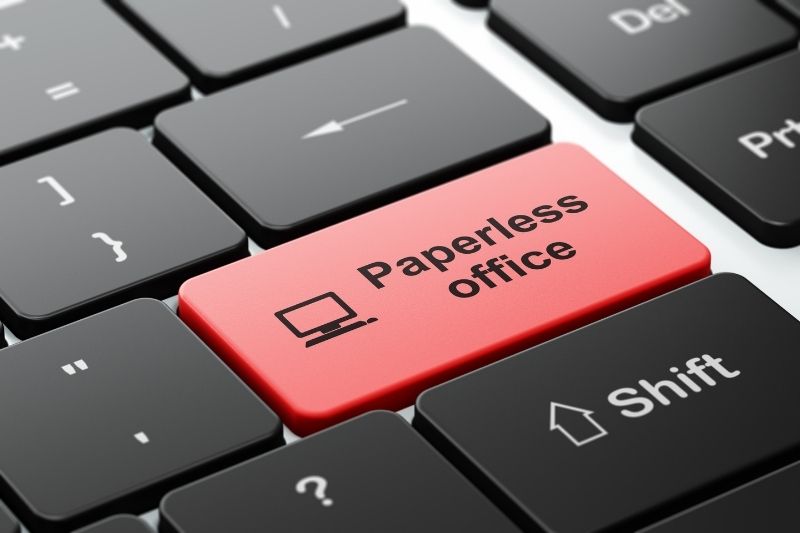It seems as if the world is getting drenched in tech. It’s literally falling from the sky (we’re looking at you, rocket boosters).
Because there is so much technology around us, it can be easy to become numb to it. We can quickly start to view it as just a “thing” that’s always there, rather than taking the time to contemplate how best to use it.
In business, technology can help you operate more efficiently. And I like to say that in business, efficiency = profitability. Oh, and you know, I like that.
Embracing technology and digitizing various aspects of your East Coast business can be daunting, I get that. But as you’ll see in today’s strategy note, it doesn’t need to be as scary as you think.
Let’s leave the paper behind…
How To Digitize Your Business by Buccigrossi and Associates
“It’s amazing what you can accomplish if you do not care who gets the credit..” – Harry S. Truman
The last 30 years has seen a massive shift in how we interact with technology. Tech used to be a thing that was mostly “in the future”, but now it’s part of all aspects of our lives. From how we communicate to how we make purchases to how our cars work and more, tech is ubiquitous.
While most big companies have embraced all things digital, many East Coast small businesses have struggled to keep up with tech. Sound familiar? As a small business, it’s just more difficult to pick and choose what technologies to embrace — not to mention that some things end up being a bigger part of your budget.
I get it, since we face the same challenge in our business.Tax preparation software, accounting software, tax planning software — these things are all expensive for us to purchase and keep our staff trained on. But, we use them because they help us do a better job for you.
What are the equivalents in your business? What can you digitize to make things better for your clients? While there is no one-size fits all answer, there are certainly general areas to consider for going digital.
Garbage In, Garbage Out (GIGO)
More than just a classic computer phrase, this is a philosophy about going digital. To understand what you can digitize, you need to view your business as a series of systems.
If you haven’t yet taken the time to create systems in your business, this is the first place to start. By analyzing how your business operates and creating processes to do things, you can then look at which of those processes can be digitized.
Sure, things like mail, invoices, contracts, and the like can all be scanned to the cloud, for example, but if you’re used to just shoving paperwork in a drawer and sorting it out later, digitizing all that may not make a whole lot of sense. But with an actual system in place, it becomes more about utility, rather than just organization.
So, what exactly is “digitizing”?
For starters, it could mean becoming a paperless office. This isn’t just about “going green”, but also about saving money and time. One study, by Nucleus Research, found that small businesses that go paperless see a return of more than $8 in cost savings for each $1 they spend on digitization. That adds up in a hurry.
Other studies have shown that paper creates more data breach risks than being digital. In large companies, paper records account for nearly ⅔ of all data breaches, according to the US Department of Health and Human Services.
Final data point: According to research firm IDC, the time wasted by employees from handling paper leads to an average productivity loss of 21.3%. That’s basically an entire day out of each work week that is unproductive due to the way in which paper actually impedes workflows.
OK, so how do you start going paperless? To start with, consider the low-hanging fruit:
- Start sending invoices to customers by email.
- Use electronic funds transfers in lieu of checks.
- Use cloud-based document sharing services within the office.
- Use software to set employee schedules and replace the old time clock.
Where you go from the basics will depend on your industry and line of work. If your business is capable of running with a remote workforce, then you could become a virtual operation and use a variety of digital technologies for communication and project management. The last year has taught us that more people can work remotely than was previously anticipated, with entire companies moving into the cloud and actually saving money on commercial real estate costs in the process.
Digital Reporting
No, I’m not talking about the new journalism division of your business.
Think about all the information that flows through your company. Your bank already provides account information digitally. You make your payroll tax deposits online via EFTPS. You might even renew your business license online, pay your state taxes online, place orders for parts and inventory online. In short, you’re probably doing more digitally than you think.
Look back on all the things that you do with data. Sit down with pen and paper — errr, I mean, a Word document — and make a list of all the information streams that you interact with digitally each week or month in the process of running your East Coast business. Then, critically analyze the workflow around that data. Are there bottlenecks caused by doing things in an “analog” fashion?
For example, all accounts receivable and accounts payable should run through a software system. Bills that need to get paid are entered into the software, and then never again shall they see the light of paper, if that’s how the bill came in. Then, to track the health of your business, reporting should be done electronically through the software — there’s no need to physically print the data.
What about information related to production, deliveries, or sales? There may be industry-specific software you can use, or find a project management or customer relationship management (CRM) software to your liking to handle these tasks for you. These systems can manage this information more efficiently, and help you actually use your data for better business outcomes. Life just gets easier when all your customer contact information, work orders, and the like are digital — and your staff are properly trained on using the software.
With these parts of your business digitized, generating reports about the health and productivity of your business becomes easy peasy.
Digitizing Production
Reporting is about looking back at what has already been done. Digital production is about looking forward.
In your Northeast business, you have a lot going on. Let’s just consider the marketing side of your business. There’s lead generation, converting leads into customers, fulfilling customer orders, etc.
Along this path, often called the “customer journey”, there are software applications that can help you out. I mentioned a CRM system earlier. There are also marketing automation softwares that can help you with handling various marketing tasks, and even more tools to help with digital customer service.
Consider, for example, live support via your website. You can install chat software on your website so that you and your staff can offer live support to visitors. These interactions can also then turn into new customers, or re-orders from existing customers. The point is using modern technology to provide answers via a real person, which will help your business to stand out in the crowd.
If you have a sales team, you can implement software that will help to parse out and distribute leads from various lead generation sources to your sales staff. There is software to help you prepare estimates, and automatically determine what parts or materials will be needed for a job. Software can help your sales team follow up consistently with warm leads in a timely fashion, to close more sales.
Again, depending on what your company does, additional levels of automation may be possible within your industry. The capabilities of certain AI systems are growing every day, providing real help to businesses. This is especially true with repetitive tasks, such as data entry. If you’re still doing a lot of manual data entry, AI can help.
This is just the tip of the iceberg, and the future looks exciting. Embracing digital solutions can be a major boost for your business, and more and more consumers are looking to do business with digital-forward companies.
What workflows can be digitized in your business? Where can software and automation help you operate more profitably? This may come as a surprise, but as accountants, we help small businesses all the time to analyze their business processes and help them with going digital. If that’s of interest to you, let’s chat:
To getting things done,
Buccigrossi and Associates






